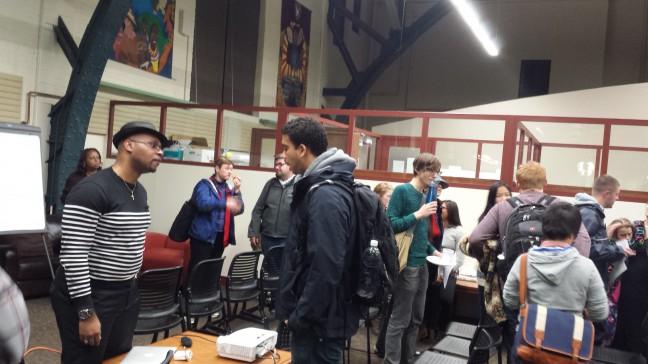The University of Wisconsin is looking for students to participate in its new diversity efforts.
Patrick Sims, UW interim vice provost and chief diversity officer, presented several diversity recommendations to students and the university community in the Red Gym on Tuesday.
The recommendations came from a committee’s report earlier this year, which developed a ten-year framework for the campus. Sims said he hopes students across campus are involved in the implementation and that he has an “all hands on deck” approach to the recommendations.
The university produces a document outlining diversity initiatives every decade, Sims said, with the first plan written in 1988 remaining fairly unchanged until 2008.
The new plan addresses five main goals, including promoting diversity values, engaging campus leadership and coordinating planning better. In addition, the university aims to improve recruitment and retention of UW faculty and students.
Sims said some of the goals can be accomplished through his office while others will need student involvement to be achieved, emphasizing he’s looking to students for ideas.
“There are five goals … some of which are things we are already doing very well and some of which are things we know we need to improve upon,” Sims said.
If students go to their website and click on “support,” they can contribute ideas for research or anything pertaining to diversity, and they can also apply to get money for their input.
In Sims’ meeting with the provost today, he said he was informed the university is putting an extra $50,000 to the program so it now has a $100,000 budget.
This is not a “one size fits all” phenomenon and there are experiences that need to be addressed especially through a student perspective, he said.
“You can imagine if you get a room of 25 different folks thinking about diversity, you’re going to have about 25 different definitions of diversity,” Sims said.
The new framework is focused on inclusiveness in how they define diversity because the old framework emphasized only racial diversity efforts. The committee expanded the definition to include differences in learning styles, life experiences, differences in ethnicity, sex and gender and age.
Fourteen of 30 recommendations can be addressed in this academic year, he said.
“The institution is going through a budget reduction exercise,” Sims said. “Part of our revenue comes from state allocations, and it doesn’t look like they’re going to go up for us. We have to make sure that we cross our T’s and dot our I’s so that our expenditures are actually going to leverage the outcomes we want.”
The 14 recommendations being implemented this year were selected because they were high priority areas, easily continued successful efforts, show potential for long-term benefits or cost little to implement.
Sims said his office will take the lead on eight of the 14 recommendations, including spearheading a call for small grants that will go toward implementing the framework. There are two $5,000 grants available for teaching excellence in diversity and inclusion.
His office also created learning communities to improve engagement with issues of diversity within safe spaces in the community.
They will also assess current pipeline programs, which were implemented to bring high-ranking students from historically underrepresented backgrounds to campus, as well as complete a “diversity inventory” process by conducting climate surveys in the campus community.
Increasing diversity in faculty is another item they will work toward this year.
Lastly, to address the six remaining recommendations, his office will form working committees.
Sims said there are five phases of implementation for the process which will occur over the next 10 years, including a midpoint review after the first five years and a second wave of implementation.
Anyone who has opinions or interest in participating in a committee should email [email protected].

















